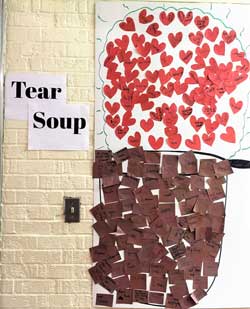When new Principal Carol Franz stepped into her role at Cedar View Elementary this year, she had no idea how many personal tragedies her building’s students would endure.
Deaths of two Cedar View students — one from cancer and one from a vehicular accident — came early on in the school year.
But all across the building there were — and often are — seasons of grief, said fourth-grade teacher Amy Constant.
“Every year we see students grieving; they lose a grandparent or a family pet,” Constant said. “And sometimes as a class we grieve with a classmate who lost a parent. For kids this is hard.”
Frantz credits an “incredible” staff and a district prepared to help students deal with grief for handling crisis and getting everyone through the year while continuing their primary task of education.
“I would like it known how incredible the support of our students, staff and district has been this year throughout the losses we have faced,” said Frantz.
“We have an amazing district crisis team who is always ready to support us in whatever ways we need. I cannot imagine experiencing the tragedies we have had as a new administrator to the district without the amazing systems of people and plans we have in place.”

Crisis Team Ready to Act
Stacie Voskuil, director of Special Education and Student Services, said that the beginning of the school year brought several challenges for the crisis team.
“We have responded to multiple car accidents that have taken the lives of our students and parents, or have dramatically and forever altered the lives of them,” Voskuil said.
The district crisis team “works together to drop everything from their daily work to immediately meet the needs of the staff and students, to build some order out of the chaos of their grieving,” she added.
The team responded to four day-long critical incidents and seven potential suicides the first 35 days of school, according to Voskuil. “Also we have faced tremendous tragedy as a district from multiple long and sad cancer battles that have come to an end,” she said.
The district offered training earlier this year, and over 40 staff members are prepared for crisis debriefing tasks. The goal is to have a process in place for helping students and staff heal and normalize their feelings, said Voskuil.
The Personal Touch
While both students and teachers go through the grieving process, everyone goes through it differently and at their own pace, said Constant. “Some cry, some need people around them, some need to be alone, and some get mad,” she said. “All are okay.”
Just figuring out how to best deliver the bad news is tough.
“I had one student whose mom was sick and we were told was doing better just before Christmas break, but when we came back we learned that she had died,” Constant said. “It was hard for the whole class.”
The variety of activities to deal with grief throughout Cedar View this year included special art projects; making cards for families who experienced loss; quiet music and downtime during the day; encouragement for journaling, writing poetry and diaries; and making sure there were opportunities for deep, thoughtful conversations, including student to teacher and peer to peer.
A hallway display — known as “Take What You Need/Give What You Can” — became a popular spot. Students left encouraging thoughts on the board, and when needed walked away with a positive note from a classmate or teacher.
When an opportunity for students to sign up to visit with a counselor was given, 14 of 28 in Constant’s classroom signed up.

Everyone Helps
The teachers found many ways and materials to share with the students. A favorite book, “Tear Soup: A Recipe for Healing after Loss, ” by Pat Schwiebert and Chuck DeKlyen, was read more than once. The main character in the book is a little red dog, who in many ways resembles the famous Hush Puppy.
“I was drawn to the dog in the book on each page,” said Constant. “He looks almost exactly like the dog mascot for their shoe brand.”
The local company, Wolverine Worldwide, stepped up to provide each student in her class one of the stuffed animals. The class sent a letter of thanks for “their new cuddly friends,” she said.
The broader community was supportive in a number of ways. One parent gave every child in their deceased daughter’s class a holiday ornament, and McDonald’s brought in breakfast for students who lost a classmate.
“Grief processing is a community task,” said Constant.
Every little gesture helps, she said, but “the process needs to be uniquely tailored to each individual.”
“It is our job to help students understand their own journey and walk beside them,” Constant said. “Teachers will at any time and for any reason alter their schedules, ingore to-dos, and drop what they are doing to meet the needs of the students and show them love.”
CONNECT









